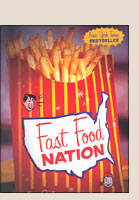The Rediff US Special/Arthur J Pais


Harish Bharti, the Seattle attorney who made headlines early this month suing
the fast food giant McDonald's for allegedly deceiving vegetarians by hiding
beef contents of its French fries, has many heroes in his profession, including highflying attorney Gerry Spence.
But in the last few weeks, it is a first-time author who leads
Bharti's list of most admired people.
Eric Schlosser's blistering attack on American fast food chains,
especially McDonald's and the meat industry, galvanized Bharti into a
legal battle against the multinational food giant.
Schlosser's book, Fast Food Nation, which has been on the national best-seller
list for over three months, is not only a fine piece of muckraking but also
a passionate invitation for mass revolt against the exploitative meat industry.
The author, whose investigative stories in such publications as The Atlantic
have made him one of the finest investigative journalists in America, begins
by offering a succinct portrait of American fast food business, then goes on
to discuss its growing clout world-wide, and delves deep into cruel ways animals, birds and human beings are handled hour by hour throughout the country -- in the name of fast profits.
Thirty years ago, Americans spent about $6 billion on fast food; in the year 2000, they
spent about $110 billion, Schlosser reveals.
"Americans now spend more money on fast food than on higher education,
personal computers, computer software or new cars," he notes as he begins to
offer an intriguing and disgusting look into the dark side of the
all-American meal.
McDonald's Corporation is now responsible for 90 per cent of the country's new
jobs. The company is also the largest owner of retail property in America, he
notes, adding that the company earns most profits from rent.
Schlosser address the growing influence of American fast food chains early in
his book. A decade ago McDonald's had about 3,000 restaurants outside
America; today, it has about 15,000 in more than 117 countries. The chain
earns most of its profits outside the USA, as does Kentucky Fried Chicken. While at least
American consumers are demanding some accountability from fast food chains,
Schlosser notes, in many other countries McDonald's and other fast food
businesses do what they like.
If consumers abroad are not vigilant, he suggests, they will become
victims to the all-enticing power of multinational food chains. Eaters
abroad, then could spend most of their food money at fast food joints. Just a
generation ago, Schlosser notes, three-quarters of the money used to buy food
in the United States was spent to prepare meals at home. "Today, about half
of the money used to buy food is spent at restaurants -- mainly at fast food
restaurants," he observes.
Schlosser presents a devastating picture of overworked meat factories and
underpaid teenage workers, a substantial number of them being foreigners.
While the meat-packing industry and fast food chains have denounced the book
as sensational and exaggerated, it has got uniformly excellent reviews from
mainstream publications as The New York Times and The Washington Post.
"It is not unusual, from time to time, to read exposes about the unhealthy
quality of mass-produced American food," the Library Journal wrote.
"What makes this book special is its indictment of the enormous US
fast food industry. The author contends that chains like McDonald's are
significant contributors to global ill-health; ugly, homogeneous landscapes;
an under-trained and unpromotable work force; and a widespread corporate
conformity that discourages the very individualism that propelled these
companies to their initial success."
The nightmarish working conditions, union busting, and unsanitary practices
have introduced e.coli and other pathogens into restaurants, public
schools and homes, he notes.
Eater beware, he continues: Forget your concerns about cholesterol, there is
- literally - faeces in your meat.
His most disturbing narration is about how the industry "both feeds and
feeds off the young", getting itself into all aspects of children's lives,
even pages of their school books, while leaving them prone to obesity and
diseases like diabetics.
"McDonald's operates more playgrounds than any other private entity in the
United States," he notes. "It is one of the nation's largest distributors of
toys." The Golden Arches of McDonald's are now more widely recognized than
the Christian cross, he adds.
Though Schlosser presents a grim picture, he also offers some practical
remedies.
He asks the government to step in to ensure not only the quality of meat,
decent wages and a hygienic workplace, but safe workplaces.
At least one-third meat-packing workers are injured each year, he reveals.
"When causes of those injuries are well known, when the means to prevent
those injuries are readily available, and yet not applied, there is nothing
accidental about the lacerations, amputations, cumulative traumas and deaths
in the meat-packing industry," he writes.
"These injuries do not stem from individual mistakes," he cautions. "They are
systematic and they are caused by greed."
In Holland, meat industry workers slaughter 100 cattle per hour, he reveals.
In America, the average is more than three times high.
While the government is beholden to the food industry, Schlosser argues,
consumers can revolt against bad food and awful working conditions.
More Americans are severely harmed every year by food poisoning than by
illegal drug use, he reveals. Harm by food poisoning is usually inadvertent and unanticipated.
"People who smoke crack know the potential dangers," he continues. "Most
people who eat hamburgers don't."
But then there is no need to be desperate.
"Eating in the United States should no longer be a form of high-risk
behavior," he writes.
"Nobody in the United States is forced to buy fast food," he adds, urging
consumers to boycott fast food chains.
"Executives who run the fast food industry are not bad men," he says.
"They are businessmen. They will sell free-range, organic, grass-fed
hamburgers if you demand it. They will sell whatever sells at a profit."
"A good boycott, a refusal to buy, can speak much louder than words."
Surely, Bharti and several fellow Hindus who are suing McDonald's know the
power of boycott.
You may also want to see
Bharti's Beef With McDonald's
BJP activists throw cowdung at
McDonald's outlet in Bombay
EXTERNAL LINKS
Unhappy
meals
Would you like ground spinal cord with that?
No Accounting for Mouthfeel
Fast Food Nation
The Dark Side of the All-American Meal
Back to top
Tell us what you think of this feature